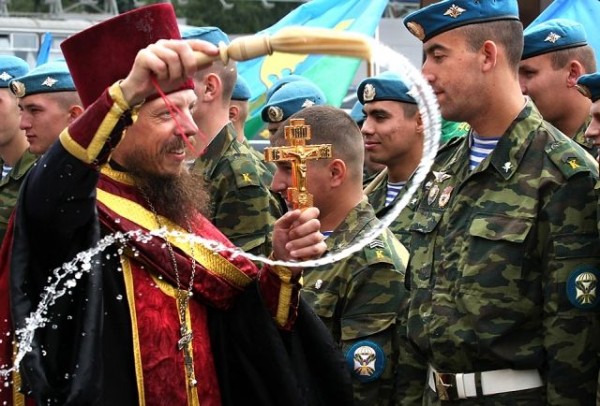Russian Missiles With the Blessing of the Church
"We have Christ the Saviour cathedral dedicated to the war of 1812, but unfortunately no church dedicated to the First World War, and there wasn't a church dedicated to the Great Patriotic War."
"Now Shoigu [Russian Defence Minister Sergei Shoigu] has suggested one, and the president [Vladimir Putin] and patriarch [Patriarch Kirill, primate of the Russian Orthodox Church] are in support."
Vladimir Bogatyryov, director, Patriot Park, military chaplain training school construction
"To live with the wolves you need to howl like a wolf. Each military priest without training is just like a person without warm clothing -- he's OK, but when weather changes it's like he's naked."
"I prayed and then landed [parachuted in training jump]. It was a lot of force ... if your legs aren't even, you can break them."
Fr. Mikhail Vasilyev, head, airborne forces headquarters church, Moscow
"A military priest should always be near so that soldiers don't become animals."
"He should show that any military conflict should nonetheless be humane and with a human face, so humans don't forget that God sees them always."
Fr. Sergy Privalov, head, synodal department for cooperation with the armed forces and law enforcement
 |
| Vladimir Smirnov / TASS |
During the era of the Soviet Union religion had no place in official, political, social or military life. Communism and religion have no formal ties; the latter rejected outright by the former. And although President Vladimir Putin admires many aspects of the U.S.S.R. and bemoans the loss of its former status in eastern Europe as a great unifying force -- which is to say forcing its neighbours into its direct line of influence as satellites -- he has also taken steps to officially redeem Russia's association with the Russian Orthodox Church.
Most nations, whether theistic or politically secular in the separation of church and state, still employ military chaplains to serve the troops pastorally, to give comfort with their presence. Under the banner of the U.S.S.R. the church's role was not merely superfluous but rejected. It is now, however, seeing a renaissance under Vladimir Putin's close personal ties with the Church and his vision for the Russian Federation's future as a God-fearing nation.
Not that since the dissolution of the Soviet Union chaplains have been entirely absent in the Russian military. But their presence has taken a large uptick with a new proposal to establish a school meant for military chaplains where they will be trained as well in military protocol. Once the school is fully operational plans to train an initial 269 chaplains will get underway for those in full-time military service, along with part-time priests in the military.
Fr. Mikhail had his own experience gained over twenty years accompanying Russian troops where war zones erupted in Bosnia, Kosovo, Chechnya and Syria. The idea is to collapse that two-decade experience in making Fr. Mikhail proficient in both military procedures and pastoral work into a concentrated formula introducing newly-assigned priests to both in a formal academic setting.
There are speculations that the school will train fighting priests similar to the airborne forces when exercises were held to teach thirty priests how to parachute and operate armoured personnel carriers. No, insisted Fr. Sergy, the centre would have on offer on military skills, teaching will be confined to three weeks of first aid lessons, along with the basics of army life.
Not so, grumbles Fr. Mikhail, the voice of experience as well as of moral conscience who recalls talking soldiers out of torturing prisoners during the second Chechen war. He argues that the school should go a little further and expand its program to include teaching chaplains how to drive military vehicles, disarm explosives and conduct navigation.
In Syria, clerics were visible, praying with soldiers, and blessing missiles with holy water in Crimea. "Mobile churches" have even been airdropped where a tent and a trailer with Orthodox attributes were to be available where soldiers could attend services in the field When the monk Alexander Peresvet fought a Mongol champion in 1380 in single combat prior to the battle of Kulikovo, the history of clergy in the Russian army was launched.
Now that the Russian Orthodox Church has regained its lost influence through the traditionalist sentiments exhibited by the Russian president, the spectacle of the president and the patriarch appearing together in public has become routine. Putin took part in Epiphany this year by dunking himself in a monastery's icy lake.
A cathedral of green metal and glass to represent the main church of the armed forces will have alongside it the new chaplain school, a pairing and an enterprise characterized by the Russian defence minister as fitting to "symbolize the spiritual values of the Russian army". Most clearly exemplified perhaps, in the blessing with holy water of missiles by a priest in purloined Crimea.
 |
| During a meeting of the Higher Church Committee, Patriarch Kirill of Moscow and All Russia pointed out the necessity of increasing the number of military chaplains in the Russian army, the improvement of their training and selection, and suggested making a film about their heroic service. Source: Pravmir.ru |
Labels: Military, Russia, Russian Orthodox Church

<< Home